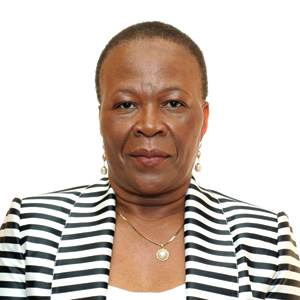
|
Tebelelo Mazile Seretse, Botswana Ambassador to the U.S.
|
The history of Botswana can be written in the life of one
person, Tebelelo Mazile Seretse, the Ambassador from Botswana to the United
States. Born in a rural Kalanga village, she turned a good education — which
included college and graduate studies in the U.S. — into a successful career in
both the private and public sectors. Seretse is busily absorbing the impact of
the diamond sights moving to Gaborone, Botswana’s capital. “I was tremendously
surprised about this news. Having grown up in Botswana, I didn’t have the
slightest idea of how diamonds are bought” on the wholesale level. Now she sees
the ripple effect of the move.
“The companies that are coming will find a highly educated
labor force. Our government provides free education up to university. The
government is trying to absorb the young graduates and give them work. They will
be easy to train; they have management skills.” There will be jobs, too, for
the uneducated, she points out: more drivers, more maids will be needed, as
well as child care. “Teaching and the banking sector will boom.”
When the country gained independence in 1966, Botswana had
two natural resources: wildlife and diamonds. “The wildlife replenishes
itself,” Seretse says, “but the diamonds will run out.” When they do, she adds,
“We definitely have a plan to replace them. This is why government continues to
invest in people. With the Diamond Empowerment Fund, the top achievers are
selected to go to Ivy League schools. They can go anywhere. They will come back
with all their modern skills.”
The industries that will sustain Botswana in the future are
power related. “The next big resource is coal deposits. We have 100 years’
worth. We have natural gas to tap. We can sell power to our neighbors.” Even
Botswana’s hot, sunny climate will be used for energy. “We have plans to
harvest solar energy.” With a laugh, Seretse says they will even make use of
all that sand that covers much of her country, the vast Kalahari Desert. “Our
sand is good for making glass.”
Currently in the second year of her four-year assignment as
ambassador, Seretse embodies her country’s can-do attitude. She was elected to
Parliament in 1999 and has served in several ministerial positions, including
Minister of Trade, Industry, Wildlife and Tourism as well as Minister of Works,
Transport and Communications. Botswana fosters “a culture of excellence,” the
ambassador points out. “Our young people grow up with cell phones. We are
introducing computers to the young in primary schools.” Most of all, she says,
the success of Botswana stems from the very nature of the Tswana people.
“We are very peaceful people. There is a humbleness. We
don’t see class; we don’t discriminate. No one is accorded less respect.” The
mind-set, she explains, is fostered by the native Kgotla system, in which
disputes are settled through discussion where everyone can speak and a
consensus is reached. “It has nothing to do with class or social standing. It
opens up people’s minds to tolerate people who see things differently. There is
a right to differ.” It is remarkably different from most of Africa, where
decisions are handed down from on high, without input or regard for the common
good.
Seretse brings a sense of honesty to her discussion that is
unique among diplomatic figures. When asked which is her favorite place, she
says immediately, “The Okavango.” But then she adds, “and Cape Town.” She has
spent time in these two very different environments and appreciates them both.
It’s the Tswana way.
Article from the Rapaport Magazine - July 2012. To subscribe click here.